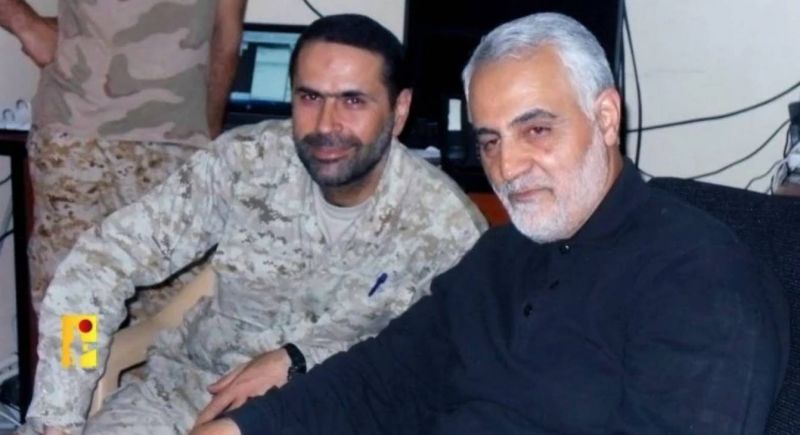
Wissam Tawil alongside Iranian general Kassem Soleimani. (Undated photo released Monday by Hezbollah's press service)
“It is as grave as Saleh al-Arouri’s assassination,” an official close to Hezbollah who requested anonymity due to the sensitivity of the issue told L’Orient-Le Jour.
On Monday, Wissam Tawil, a senior Hezbollah military commander, was killed in an Israeli strike that targeted his vehicle in Kherbet Selm in Southern Lebanon.
Tawil is the highest-ranking official to be killed since the party started hostilities against Israel in support of its Palestinian ally, Hamas, in the wake of the Oct. 7 attack.
According to a security official who spoke to AFP on condition of anonymity, Tawil played a leading role in the military operations taking place in SouthernLebanon.
Tawil’s assassination follows that of Saleh al-Arouri, Hamas’ second-in-command, just a week ago in Beirut. The move seems to signal a notable change in Israel’s modus operandi.
Commander of Al-Radwan force?
Born in 1975 in Sour, Tawil was part of Hezbollah’s new generation of military leaders. Despite his young age, he was considered a high-caliber member of the party.
Photos circulating on social media showcased his interactions with Hezbollah leader Hassan Nasrallah, the late Qassim Soleimani of Iran’s Islamic Revolutionary Guard Corps (IRGC) Quds Force, who was assassinated in 2020, and Imad Moghniyeh, a senior Hezbollah military official killed in 2008.
Reports indicate that Tawil held a significant role as a senior commander within the Al-Radwan Force, Hezbollah’s special operation unit.
“He could be the top commander of the so-called al-Radwan unit,” said Ali Amin, editor-in-chief of the al-Janoubia news website and an expert critical of Hezbollah.
“He was an important leader who recently took up his military duties,” said the official close to Hezbollah.
The Israeli press, including Haaretz, portrays Tawil as having played a prominent role in the Hezbollah-led kidnapping of two Israeli soldiers — a pivotal operation that triggered the July 2006 war.
Israel fears that members of the Radwan unit could infiltrate its borders, as Hamas did on Oct.7.
As a precautionary measure, Israel is urging the withdrawal of Hezbollah’s forces from the border area north of the Litani River. On Nov. 23, 2023, an airstrike targeting a house in southern Lebanon resulted in the deaths of two Radwan unit leaders and the son of Hezbollah’s parliamentary bloc head, Mohammad Raad.
Several sources told L'Orient-Le Jour that Tawil played a significant role in the attack on the Israeli military observation and air control base at Meron.
In response to the assassination of Arouri, Hezbollah claimed responsibility for launching 62 missiles at the site on Saturday, causing what the Israeli army acknowledges as “significant damage.”
According to Hezbollah, the Meron base is the only surveillance and air control center in northern Israel and was therefore at the heart of the operation against Arouri and Beirut’s southern suburbs.
“Israelis I think have backup measures, I don’t know the significance of the damage, but I doubt that it would stop Israel’s air activity in Lebanon and Syria,” Nicholas Blanford, journalist and author of “Warriors of God: Inside Hezbollah’s Thirty-Year Struggle Against Israel,” told L’Orient Today.
“In a way, it is a retaliation to a retaliation,” Amin commented.
‘Hunted down one by one’
Tawil’s assassination comes as many analysts believe hostilities between Israel, Hamas and Hezbollah could evolve into an intelligence war.
On Monday, Israeli Defense Minister Yoav Gallant told the Wall Street Journal that Israel was about to enter the “third phase” of the war, moving from an intensive combat phase to more targeted operations.
This is a battlefield that is likely to be to Hezbollah’s disadvantage.
“Within Hezbollah, people are wondering how the Israelis are managing to oust one by one senior members and leaders of the ‘axis of resistance’,” said the official close to the party. “Investigations are underway to identify the source of the security breaches.”
Simultaneously, Israel is escalating its military activities in southern Lebanon and the intensity of its operations is increasing daily. Over the weekend, the Israeli army conducted strikes on the town of Kaouthariyet al-Siyad near Saida, approximately 50 kilometers from the border.
Israel’s rhetoric also continues to escalate.
“We can do in Beirut what we did in Gaza,” Gallant told the Wall Street Journal in a threat to Hezbollah.
Israeli Prime Minister Benjamin Netanyahu echoed this sentiment a few hours earlier, delivering a warning reported by Haaretz: “You cannot provoke us.”
Could Hezbollah be tempted to escalate its retaliation? For the moment, the importance of Tawil’s assassination is seemingly being played down.
Hezbollah spokeswoman Rana Sahili told L’Orient-Le Jour that “Tawil was a military commander, nothing more and nothing less,” and refused to comment on his link with the Radwan unit or the party’s upper echelons.
That evening, however, Hezbollah published a biographical note on Tawil, quieting comments that played down his role within the party.
Last week, after an overnight strike on Naqoura, Hezbollah also played down the assassination of Hussein Yazbeck, who was identified by observers as a “senior official,” in the party.
Hezbollah claims Yazbeck was a “local official” and hasn’t announced retaliation for his assassination yet.
Amin believes that in Tawil’s case, the party will likely retaliate.The key rule, however, will remain the same: “avoid provoking a full-scale war with Israel,” said Amin.
“Hezbollah doesn’t want that.”
This article was originally published in French in L'Orient-Le Jour. Translation by Sahar Ghoussoub.